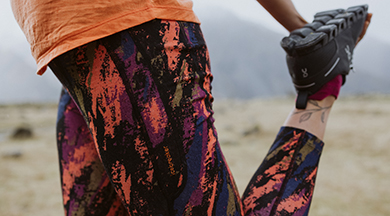Is merino wool warm?
19 November 2024
Merino wool, from the merino sheep breed native to New Zealand's landscape, is a wonder of nature. It's a highly effective insulator and keeps you warm in the winter, but thanks to its clever natural thermoregulating properties it also helps to keep you cool in the summer. This premium natural fibre provides warmth exactly when you need it, using its breathable fibres which manage moisture. Let's take a closer look at why merino's softness, temperature regulation, resilience, and natural odour resistance make it a popular choice for all seasons.
What makes merino wool warm?
Wool is an excellent insulator, as the natural crimp of the fibres creates pockets which trap heat to help keep the cold out. Merino wool goes a step further than regular sheep's wool because it has much finer fibres and a tighter crimp, which is highly effective at keeping you warm in the great outdoors without adding bulk.
As well as warmth, merino wool fabric offers exceptional moisture-managing properties, which helps keep you dry by absorbing sweat from your skin and releasing it into the air. This adds to its coziness during wet or snowy conditions, as well as providing a handy odour control system. Alongside its softness and versatility, it's easy to see why merino wool is popular for thermal base layers, activewear, and knitwear.
How does merino wool compare to other types of wool?
Unlike standard or synthetic fibres, merino wool is known for being soft, resilient, and multifaceted enough to wear all year round, as it adjusts to your body's temperature needs by absorbing moisture from your skin. Merino sheep need to adjust from freezing winters to hot summers on their harsh terrain, so the benefits their premium wool brings to Icebreaker clothing can be enjoyed by all the family. Here's how merino wool vs wool from other sources holds up:
Moisture management: Breathable merino wool has an excellent natural moisture management system, absorbing sweat to help keep you warm and dry. Unlike other fabrics, it can absorb up to 35% of its weight before feeling wet.
Next-to-skin softness: Merino wool fibres are significantly finer and smoother than standard wool, and it flexes against your skin rather than scratching it, meaning it won't itch like other wools can.
Warmth: Merino's thermoregulating properties help keep you warm in winter and cool in summer. The fine fibres adapt to your body, making it a truly versatile material for all-seasons clothing. Unlike standard wool or cashmere, it won't add bulk and is ideal for sportswear, kids' clothing, and underwear.
Natural odour resistance: Merino wool offers natural odour resistance which synthetic fibres do not. Merino absorbs odours and releases moisture to help you stay dry, and may mean you'll need to wash your clothing less frequently.
Resilience: Wool is naturally strong, and merino wool can stretch over 30% before breaking. Icebreaker's range is built to last, making it a great choice for outdoor sports and durable kids' separates.
Renewable, biodegradable fibre: Unlike synthetic fibres, merino is sustainably and ethically sourced, and the fibres break down naturally in the soil.
Is merino wool good for winter
In answer to the question: is merino wool good for winter?, the answer is yes, thanks to its thermal insulating properties. But unlike other wools, it's also lightweight and breathable, making it ideal for summer, too. Just as the merino sheep need to adjust to snowy weather after a hot summer, Icebreaker's premium materials work hard to keep you warm and dry in snow, rain, and all weathers in between.
Merino's natural temperature regulation makes it the perfect choice for base layers and mid layers, as well as thermal underwear and even outerwear such as coats and jackets. Layering becomes key in the cold, so our selection of separates offers unrivalled next-to-skin comfort which won't itch or irritate.

Benefits of merino wool for outdoor activities
Merino's adaptability and versatility make it the preferred choice for outdoor activities, as it's also lightweight, insulating, soft against your skin, and remarkably durable. It's warm wool, but reimagined for a modern adventurer, sports fan, or active family who enjoy getting outside no matter what the weather. Because of this, merino wool leads the way when it comes to all-seasons clothing for hiking, running, camping, yoga, gym wear, travel wear, snow sports, and ski wear.
Icebreaker's advanced layering system is designed to offer exceptional performance in all conditions. Using the correct layering sequence can provide enhanced comfort, as well as adapting to your activity levels, temperature, and changing weathers. The main benefits of merino wool are that it combines comfort with endurance, and will work hard for you, no matter what the weather.
Is merino wool warm in all seasons?
Being able to adapt to all seasons is one of merino's most prized qualities. If you're wondering how does merino wool keep you warm in winter but cool in summer, its temperature-regulating and insulative properties trap heat in colder conditions, whilst its breathability and moisture management help you feel cool in the heat. In fact, away from the winter months, merino is the fabric of choice for many people when it comes to sportswear, and wearing lightweight merino wool for summer merino wool for summer gives you a new-found respect for this amazing material which adapts to combat all conditions.
Is merino wool warm - Summary
Merino wool is as versatile as it is soft and comfortable to wear, precisely due to its fine fibres, clever structure and breathability - which is how merino wool keeps you warm in winter and cool in summer. All wool types can be warm, but with merino you’ll experience its moisture management, natural odour regulation and luxurious softness without the bulky, scratchy feeling that can come with traditional sheep’s wool. It’s also more durable than cashmere, and can be enjoyed throughout the seasons, no matter what the trail may hold. Upgrade to merino comfort and explore our products today..
Is merino wool warm - FAQ
Is merino wool warm enough for winter?
If you're wondering: is merino wool good for winter? The answer is yes. It may be lightweight and ultra-soft, but the clever fibres trap heat to insulate you against the cold. It's great for layering.
Is merino warmer than fleece?
So, does merino wool keep you warmer than fleece? It depends on the quality of the fibres, and whether they’re natural or man-made. Merino is an excellent insulator, like fleece, but it’s softer, manages moisture better and is highly absorbent, keeping you dry and warm.
Is cashmere or merino wool warmer?
Cashmere is considered warmer than merino, due to its higher loft, but this doesn’t mean it’s the better choice for the winter months. Merino wool is more durable, versatile and easier to care for. It’s less prone to pilling, and it’s lightweight so can be layered for additional warmth.
Are merino wool socks warm?
To answer the question of are merino wool socks warm, the answer is yes, but thanks to the wool's natural thermoregulation and breathability, they can also keep your feet cool and dry in warm conditions by absorbing sweat.
More for you

What is merino wool
10 December 2024 | icebreaker

How to wash merino wool?
01 October 2024 | icebreaker

Merino wool benefits
29 November 2024 | icebreaker










